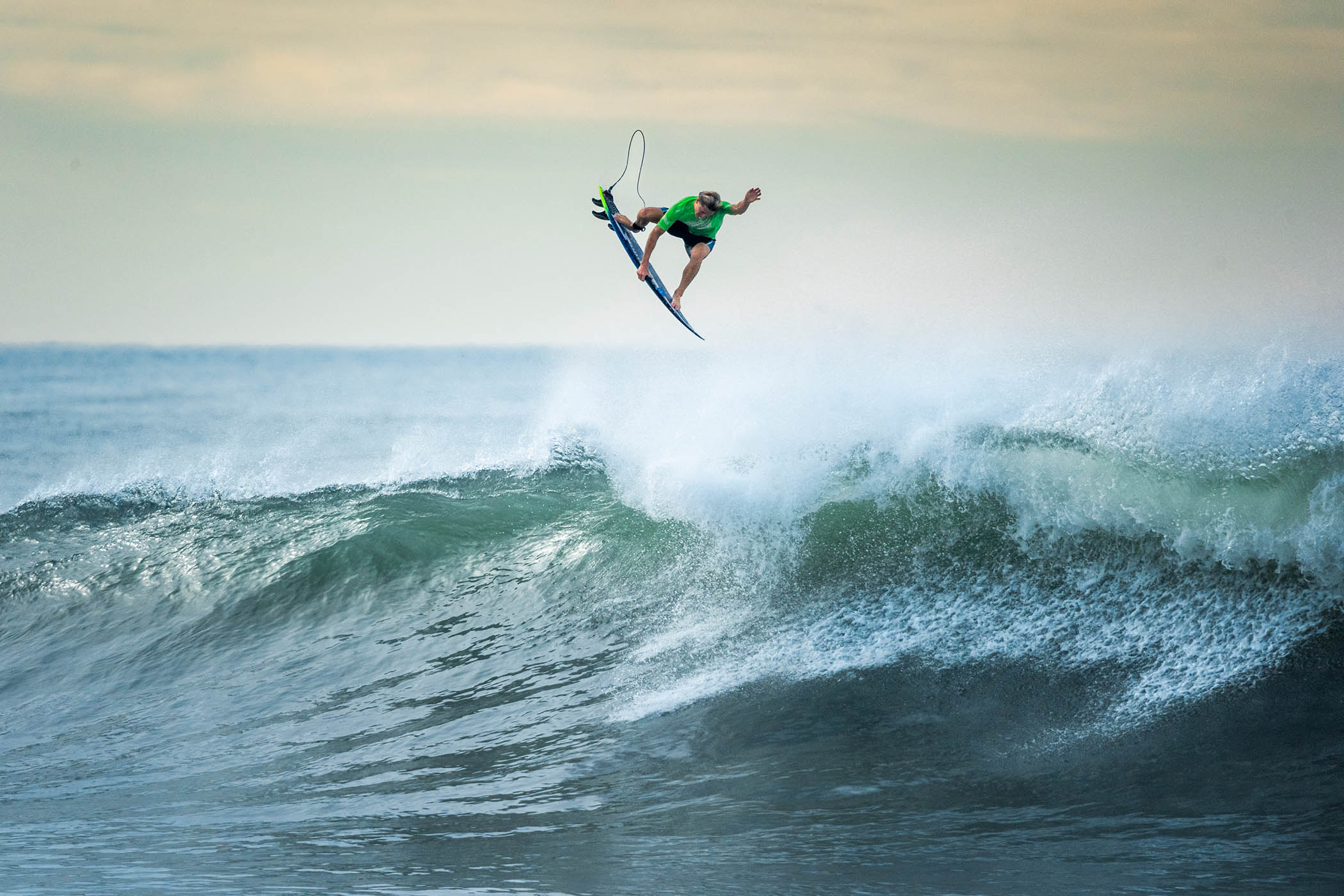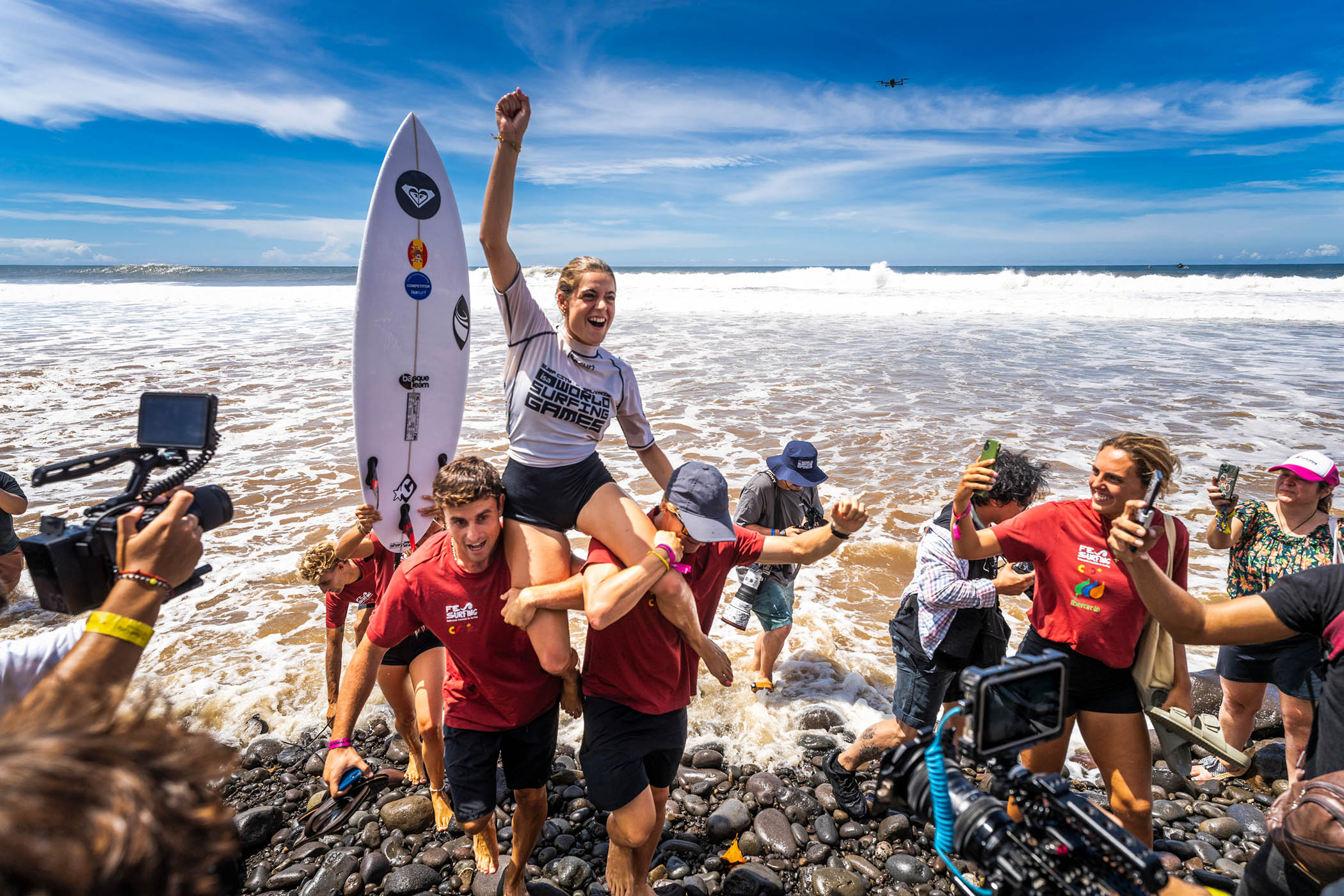‘There’s so much power in the wave,” says Australian pro-surfer Sally Fitzgibbons. “It’s like someone broke the tap and it’s just endless swell. I don’t know any other place in the world that’s this consistent.”
As she speaks, Fitzgibbons watches surfers on the waves unpeeling along El Salvador’s rocky shores. A combination of river mouths and rocky points transform swells in the Pacific ocean into the surfers’ dream of barrelling waves. Further back, onlookers sip Salvadorean coffee from a platform that smells of freshly cut wood.
The buzz in Surf City, as this part of the coast is called, reminds Fitzgibbons of Nazaré in Portugal. It went from fishing village to surf mecca in the space of 15 years. Her team were crowned champions at this month’s World Surfing Games (WSG) in the coastal town of El Tunco.
An international surf contest in El Salvador would have been unthinkable a decade ago. In 2015, the murder rate was 106 per 100,000 – comparable to war-torn countries. Last year, it was 1.9 per 100,000, making the country about as safe as Canada.
The difference is down to the young president, Nayib Bukele, who came to power in 2019 promising to crack down on gangsters. But it came at a price. He has stripped civil liberties, eroded judicial independence and dismantled checks on his power.
Under a state of exception first imposed in 2022, authorities rounded up more than 85,000 people – about 5% of men aged 18-35 – without trial. El Salvador now has the highest rate of imprisonment in the world. A raft of constitutional rights remain suspended as the state of emergency enters its fourth year. Salvadoreans may be looking at their president for life, as in July the constitution was changed to scrap term limits, abolish run-off elections and extend presidential terms from five to six years.
Bukele is “following the authoritarian playbook” says Juanita Goebertus, Americas director for Human Rights Watch. “It always starts as a narrative of saying it’s just the bad guys, but … soon really no one has any more civil rights,” she warns.
Alongside the crackdown, Bukele has tried to transform El Salvador’s image, promoting bitcoin and styling himself as “the world’s coolest dictator”. That’s where surfing comes in.
The president is betting on the world-class waves to develop the economy. In January, the International Surfing Association signed a three-year deal with Surf City, which has hosted two dozen surfing competitions since 2020.
In the same way as Qatar benefitted from hosting the 2022 football World Cup and China from the 2008 Olympics, El Salvador believes sport can change its image for the better. It is also at the heart of a plan to grow tourism, explains Morena Valdez, El Salvador’s minister for tourism. She is confident that, when surfers visit, they will also want to climb a volcano or visit a coffee farm.
Newsletters
Choose the newsletters you want to receive
View more
For information about how The Observer protects your data, read our Privacy Policy
Marketing videos of surfers helped to attract 3.9 million visitors last year, making El Salvador among the top five fastest growing tourist destinations worldwide. Tourism as a share of GDP has already more than doubled in five years, reaching 14% in 2024. That income is important for a country where GDP was just $5,500 per capita in 2024.

Australian Dane Henry rides a wave at El Salvador’s Surf City.
A construction boom has followed. Earlier this year, work began on Surf City 2, a megaproject along the eastern stretch of coast that includes plans for an airport. On the way to El Tunco, yellow signs announce “Surf City, under construction”. The skeletons of new hotels and judging towers have sprouted above surfing beaches. “People feel the country is safe enough now that they can bring their families,” says José Orellana of Wave House, in El Zonte, which rents luxury apartments overlooking “bitcoin beach”, a stretch of black sand framed by mountains.
Thirty miles north-east in the capital, San Salvador, Enrique Gálvez said the transformation has been rapid. “It didn’t make sense to have a business,” he said, because street gangs killed and extorted with impunity. “You were literally working for them.” Young recruits even fleeced the shop his mother ran in a school, he said.
With Bukele in charge, Gálvez feels his family has been given a second chance. The way he sees it, hand-wringing over democracy does not get your child to school safely or stop gangs strangling your business. “I see what’s good for my family and my future … if that’s a dictatorship, how wonderful,” he said. Across Latin America, voters fed up with crime and corruption tend to agree. Nearly half of Salvadoreans polled think it is necessary to sacrifice the rights of a few for the greater good.
In August, Gálvez opened an ice-cream parlour in Plaza Libertad, an area once controlled by gangs. Beyond his shop window, families cycle along new bike lanes that skirt the freshly plastered cathedral and children shriek in fountains. Inside the gleaming, Chinese-funded library, teenage boys pore over Harry Potter books. “There were curfews at six in the evening, there wasn’t a soul here,” Gálvez said. Now, the country is “10 out of 10”.
Not everyone would give El Salvador top marks. Security forces arrested Ruth López, a lawyer investigating government corruption, in May, followed by Enrique Anaya, a constitutional lawyer who had warned against the dismantling of democracy. Bukele also wields his repression against farmers, environmental activists and journalists who criticise the regime.
I see what’s good for my family and my future … if that’s a dictatorship, how wonderful
I see what’s good for my family and my future … if that’s a dictatorship, how wonderful
Enrique Gálvez
He has profited from Donald Trump’s war on Latin American migrants too by helping Trump delete undocumented migrants from any legal system by accepting them into El Salvador’s mega-prison, the largest in the Americas.
Some Salvadoreans are increasingly rattled by their leader’s assault on democracy. “He’s done good things, but he should not follow this dictator thing,” says someone who voted for Bukele last year, who did not wish to be named. “There is not really freedom of speech,” says another. “Speaking out could put your business, house, family at risk.” In a survey, 58% agreed.
Where does this leave surfboard-toting tourists? There are no calls for boycotts, given that it will not help ordinary Salvadoreans who want to escape poverty, a root cause of violence. Besides, plenty of surfers travel to Nicaragua, ruled by the authoritarian Daniel Ortega.
Bukele hopes surfing will prove more useful for the bottom line than his bet on crypto. In 2021, he made El Salvador the first country to accept bitcoin as legal tender. But the crypto-fantasy hasn’t lasted. In February, the IMF forced the president to scale back his experiment in exchange for a $1.4bn bailout.
There are concerns the tourism boom will not be equally shared. A few years ago, El Tunco was “a rocky road, there were pupusarías [a place to buy local griddle cakes], a few hostels and locally owned seafood restaurants”, explains Miguel (not his real name). Visitors are good for business, he admits, but he is troubled by rising rents. Locals fear that so much construction close to shore could affect the rivers that feed the ocean and produce the world-class waves. Valdez admits development “has been faster than we thought”, yet insists sustainability is her priority.
Still, Miguel is uncertain about the future. “In 10 years this is going to be a different place,” he says. “I don’t know if that’s a good thing.”
Photographs by Sean Evans/ISA
